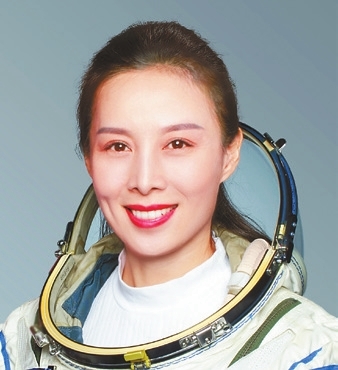
FREQUENT goodbyes to her family came hand-in-hand with Wang Yaping’s intensive training. This time, however, her goodbye sparked joy in her 5-year-old daughter’s eyes as she is “shooting for the stars.” Wang is one of the three astronauts who take part in the Shenzhou-13 crewed mission. She becomes the first woman to enter China’s space station core module Tianhe. While Wang’s six-month trip to space will be the longest absence from her daughter, she and two other astronauts, Zhai Zhigang and Ye Guangfu, of the Shenzhou-13 space mission will make the longest ever stay in space by Chinese astronauts. The last time Wang was in space was eight years ago, three years before the birth of her daughter. The female Chinese taikonaut captured headlines all over the world by an image of her being reflected in a drop of water floating in the Tiangong-1 space lab. Known for broadcasting a 40-minute live lesson that included demonstrating the behavior of liquids in zero gravity during her first space trip, she is very likely to draw global attention again during her second space mission. More tasks await her: a spacewalk and the second class in orbit. Wang was born in 1980 to a rural family in Shandong Province. She loved jogging and was a high-scoring forward on the basketball court in school. “When I was young, my dream was simple: to go beyond the village and to pay back all that my parents had given me,” she said. Her space dream started in 2003 when China sent its first taikonaut Yang Liwei into space. “I watched the bright rocket flame on TV, and an idea flashed through my mind: China now has a male taikonaut, when will there be a female one?” Wang said. At that time, she was already a transport aircraft pilot with two years of experience in the People’s Liberation Army Air Force. After racking up safe flights for 1,600 hours over nine years, Wang was selected into the second batch of Chinese taikonauts in 2010 and became a strong candidate for China’s first flight by a female taikonaut. However, she did not pass her final tests and Liu Yang was named the “first female” taikonaut. Wang did not lose heart but pushed forward even harder. The backup taikonaut always ran three laps more than others in physical courses; she volunteered to be held to the same standards as her male counterparts during desert survival training, and she asked to train in the pressure chamber for an extra 30 minutes each time.“You can’t catch a break simply for being a woman,” Wang said. Her efforts were not in vain. Wang became a crew member of the Shenzhou-10 space mission in 2013. And more notably, she earned the title of China’s first space teacher after giving a telecast lecture to students from an orbit more than 300 km above the Earth. Wang’s ponytail, smiling face and soft-spoken voice attracted millions of hits on social media, where she has been known as a “space heroine.” (Xinhua) | 
